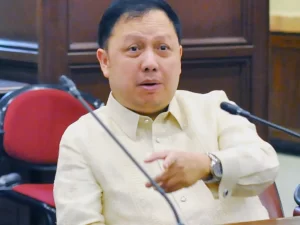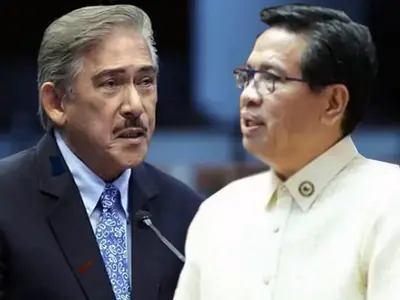
THE House Committee on Justice, chaired by Batangas 2nd District Rep. Gerville Luistro, will launch a motu proprio inquiry into the United States’ extradition request for controversial pastor Apollo Quiboloy, in a bid to clear up what lawmakers described as “insufficiencies and ambiguities” in the process.
The upcoming inquiry was prompted by a written request from Akbayan Party-list Rep. Perci Cendaña, who urged the Luistro panel to conduct an inquiry in aid of legislation on Quiboloy’s case.
“There is an overwhelming public interest and concern over the process by which extradition requests are received, evaluated, and acted upon. It is imperative that Congress, through your Committee, provide a forum where concerned agencies may clarify the status of the present request, explain the legal and procedural steps involved, and identify any gaps or ambiguities in our existing laws and treaties,” Cendaña stated in his letter, which was read by Luistro during the panel’s organizational meeting Tuesday.
Committee vice chairman, Bukidnon 2nd district Rep. Jonathan Keith Flores, made the formal motion to carry out the probe.
“I move that the Committee on Justice conduct an inquiry in aid of legislation in accordance not only with the request of Congressman Cendaña but also to cover PD (President Decree)1069 and all other related laws on extradition,” he said.
Luistro carried the motion after hearing no objection from the members. But before this, the lawmakers engaged in a thorough discussion on the need for such probe.
She said the two significant laws on the matter that must be taken up are 1994 extradition treaty between the U.S. and Philippines and PD 1069 or the Philippine Extradition Law enacted in 1977.
According to her, the two laws are “silent” to some pertinent details. “There are questions which answers could not be found in both law.”
“The following arguments or issue with respect to the existing laws on extradition in the Philippines were raised: one, whether an extradition process may be initiated by a foreign country when the extraditee has pending cases as well in the Philippines; second, what is the timeline between the request by the Department of Foreign Affairs (DFA) [and] the transmittal the Department of Justice (DOJ), in the same manner, what is the timeline between the receipt by the DOJ [and] the filing of the petition for extradition with the proper regional trial court,” she said.
“Number three, it was also raised which court shall acquire jurisdiction over the request for extradition…whether the court which has jurisdiction over the local cases or the court where the extraditee is a resident of as mentioned in the treaty or PD 1069,” she added.
During the discussions, Flores also pointed out that the existing laws do not say who will exercise authority to choose between temporary surrender and deferred surrender of the extraditee–something Luistro acknowledged.
“We understand that in the treaty, and even in PD 1069 it was made clear that it will be the [DOJ] through the chief state counsel who will be filing the petition for extradition. However, once the same is granted…the question now is, who will exercise the authority to choose whether it will be temporary surrender or deferred surrender?” She said.
Luistro said that Kingdom of Jesus Christ (KOJC) church founder Quiboloy’s involvement in the probe was merely incidental.
“This is not about prejudging anyone’s guilt. It is about upholding the rule of law, honoring our treaty commitments, and ensuring that victims see swift, fair, and transparent action,” Luistro stressed in an interview.
“Our message is simple: no one is above the law. We will ask the DOJ and DFA to walk the public through the precise legal options—temporary or deferred surrender—and the concrete timeline so justice is neither delayed nor denied,” Luistro said.
She concluded by affirming that the House, through the Justice Committee, will work to strengthen the country’s extradition framework, ensure accountability, and reinforce the administration’s commitment to international cooperation against serious crimes, while respecting the independence of the courts.



